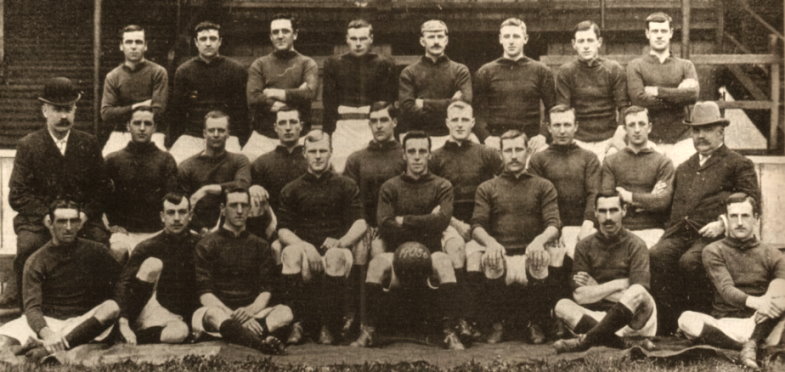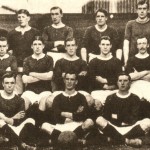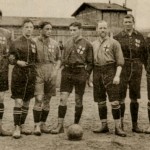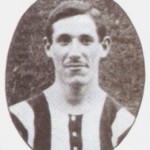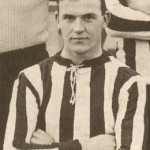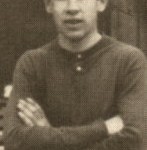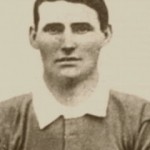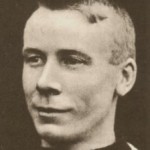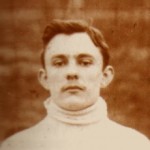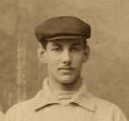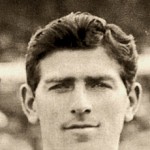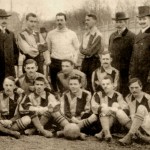CURIOSITIES OF WORLD FOOTBALL (1906-1910)
Picture : Liverpool FC 1906
- Arsenal FC 1904
- Freiburger FC 1907
- SH Marseille 1909
- Velodromo Paulista 1905
- Alphonse Wright
- Billy Hogg
- George Holley
- Harald Bohr
- James Quinn
- Joe Bache
- Joseph Vanderstappen
- Roger Piérard
- Sune Almqvist
- William Robert McCracken
- MAC Budapest 1907
1906
Withdrew from the league championship because of three players
In Denmark, Kjøbenhavns Boldklub (KB) – the oldest and most popular club in the country – was cause of great confusion. Due to a disagreement between the club’s board and three of its best players, “KB” did not play in the league championship (1905/06). The club’s directors barred to the three players for one year and transferred the others to the club’s second team, which played in a lower division and so ended up scoring some 20 goals per match.
A curious decision
On March 4, 1906, Union St. Gilloise were to play a Belgian league match away at Racing Club in Brussels. Since defender Roger Piérard had just suffered a death in the family, Union asked for the match to be postponed. The Belgian FA (UBSSA) turned the request down, but added that it would permit it in case of an extraordinary event. This was precisely what happened, for referee Van Reusel declared the pitch unfit to be played on. Still, he let the teams play a friendly, which Racing Club won (2:1). None of the 500 spectators at ground were aware of this, and so did not realise that their team’s victory counted for nothing. The Belgian FA suspended Van Reusel for a long time.
National player, national coach and Olympian gold in swimming
In 1906 the Hungarian FA appointed Alfréd Hajós-Guttmann as the new national coach. As recently as 1902, he had been an inside forward and captain at Hungary’s international début in Vienna (0:5 Austria). The multi-sportsman (born on February 1, 1878) had been Hungarian champion with Budapesti Torna Club in 1901 and 1902, and played football until 1903. Earlier, in 1896, he was the first Hungarian to win the Olympic gold (100 m freestyle swimming) at the games in Athens.
A Welsh Cup final without any Welsh teams or players
April 16, 1906, saw the first Welsh Cup final in history without any Welshmen in it, for both finalists came from Shropshire, a county in England bordering the north of Wales. For Wellington Town FC it was the second Welsh Cup final (after 1902), while Whitchurch FC lost despite taking the lead twice during the match (2:3). The only Welshman on the pitch during this Welsh Cup final was referee Richard Thomas Gough, because in both teams played no Welshmen.
Concealed his nationality so he could play for another country
On April 22, 1906, in Paris outside right Alphonse Wright of Racing Club de Bruxelles made his international début for Belgium. That he was English, and hence ineligible, was not noticed by both hosts France and the “Union Belge des Sociétés de Sports Athlétiques” (UBSSA). Only two years later, after Wright had played his fifth full “A” international for Belgium, did the Belgian FA realise that he had only British citizenship, and so did not call him up for the Belgian national team anymore. Wright, for his part, had cleverly concealed the fact, all the more since no-one had ever asked him for his nationality.
IFA at the end of its wits – two champions
In the Irish league, Belfast rivals Cliftonville FC and Distillery FC topped the table together, even on points. Since goal average were not used for rankings at the time, a play-off was necessary. When this ended scoreless, and the second play-off also ended in a draw (2:2), the Irish Football Association (IFA) was at the end of its wits and proclaimed both clubs national champions.
Unisono champions
In England, the 1905/06 season saw a double sensation. League climbers Liverpool FC became English champions with a four-point lead. What the “Reds” from Liverpool did in the English top division, Bristol City FC did in the second division easily managed the title and promotion to the top division – ahead of Manchester United FC and Chelsea FC (London). The “Robins” lost only two of 38 league matches. In tte following season, 1906/07, the promoted Bristol City FC were English vice-champions, with only three points behind Newcastle United FC.
Rivals, yes, but morally superb
The season started out with a shock for Glasgow Celtic FC. On August 16, 1906, grand Celtic goalkeeper David Adams was seriously injured during a charity match between local rivals Rangers and Celtic (4:2) at Ibrox Park. In true sporting spirit, Rangers promptly offered their reserve keeper Thomas Sinclair, who tended goal for Celtic for their first six league matches without conceding once. After “Dave” Adams had recovered, he played the remaining 28 league matches and “Tom” Sinclair returned to his Rangers. What a fabulous show of fairness between the otherwise rivalling Glasgow titans!
Won’t move? No more football, then!
In Brazil, AA do Mackenzie College (São Paulo) were forced to withdraw from the 1906 season of the “Campeonato Paulista”, as they should be moved to the USA. When its student players refused, the club had to suspend all footballing activities. Up to this point, the student side had played only half its league matches in the championship of the state of São Paulo.
The case of the Queen of Norway and the torn shorts
1906 was the first Norwegian Cup final to be attended by King Haakon VII and Queen Maud. During a duel between Odds BK Skien full-back Øivind Gundersen and Sarpsborg BK’s English outside right Hugh William Kenworthy, the Norwegian’s shorts (which then still reached down to the knees) were torn, to the amusement of the 3,000 spectators. The Queen publicly said, “I am sorry for the young man”, to which Øivind Gundersen replied: “Never before has the queen seen such thighs.”
1907
Once again two English teams in the Welsh Cup final
The impossible happened. As during the previous season, on April 1, 1907, two English teams reached the Welsh Cup final again. Whitchurch FC reached the final again, although this time with eight new players, but lost to Oswestry United FC (0:2). The main difference between this final and the 1906 one was that this time each team counted one Welsh player (George Davies resp. George Wynn, who also scored a goal).
Spanish goalkeeper scores after fairytale solo
The last group match of a Spanish tournament (March 1907) – where Madrid FC met RC Recreation Huelva (4:2) – was a curious affair, and not only because the Madrilenes loaned two of their players to the opponent, but also because Huelva goalkeeper Juan Manuel Fernández Balbuena intercepted a ball in his own area, outdribbled all the Madrid players down the length of the pitch and finished by scoring a goal for his team. His team-mates carried him on his shoulders like a matador.
The smartest German champion of all times
Freiburger FC won the title the 1906/07 season thanks to clever tactics. With four Ph.D.’s and several lesser graduates, the Black Forest side made history as the smartest German champions of all times. The south Germans eliminated defending champions VfB Leipzig (3:2) in the semi-finals, and beat Berlin side Thor- u. FC Viktoria 1889 (3:1) in the final.
Danes at the end of their wits: No champion this year!
In Denmark, goal average still were not used to break ties if teams were equal on points. Thus, when in 1907 there was the third case that at least two clubs were placed with the same number of points on the top of the table, the association decided not to proclaim and to honour a champion. This left a particularly bad taste as on November 4, 1906, Kjøbenhavns Boldklub (KB) had beaten “Akademiker” (university students & academics) 4:0 but the KBU ordered a replay, the reason being that the match was played in positively foul weather – with torrential rain, storm, hail and snow – and the pitch was badly flooded. Unable to win the replay, “KB” eventually topped the table together with Boldklubben af 1893 København, the two teams even on points.
Swedish international and 13 times Swedish champion in bandy and tennis
To the stars of the Swedish vice-champions in 1907, IFK Uppsala, also counted outside right Sune Almkvist, who was popularly known as “Bandykungen” [bandy king] and was a universal top-notch sportsman: a football international, 11 times Swedish bandy champion, twice Swedish tennis champion, and a good golfer to boot.
All league matches on one pitch
The 1907 season of the “Campeonato Paulista” (state of São Paulo, Brazil) was contested by six teams. Except for one, all 29 league matches were played one the same pitch: the Velódromo Paulista, on the Rua Consolação (São Paulo). The two teams from Santos also played their league matches there. Furthermore, only one league match was played on any given day.
Live scores by carrier pigeon
When Hungary met Austria (4:1) in Budapest on November 3, 1907, after each scored goal was relayed by carrier pigeon to Vienna, Graz, Linz and Prague. Two of the four Hungary’s goals were scored by outside left Dr. Gáspár Borbás of MAC Budapest (born on June 26, 1884), who had graduated in veterinary medicine. Hungary’s centre-half was Izidor Kürschner-Szűcs of MTK Budapest. The then 22 year-old “Dori” Kürschner would go on to become a great and successful coach, also in Germany and Switzerland.
1908
Match abandoned because of a bad ball
For a number of reasons, defending champions Union Saint-Gilloise, who were rather used to win, had unexpected difficulties fielding a full team for the league match in Kotrijk on January 12, 1908. Fortunately, while they were waiting for the train at the Brussels railway station, the Union players saw referee Albert Tobias, who was a member of the club and on that same day was scheduled to whistle a league match at Cercle Sportif Brugeois. Although Tobias had hung up his boots three years ago, the Union players managed to convince him not to travel to Bruges (Brugge) and instead complement their team as the 11th man.
When the match against Sporting Club Courtraisien remained drawn (1:1) ten minutes from time, the Union players succeeded in having it abandoned after the ball deflated and the reserve ball, which had been used for another match earlier that day, did not appear suitable in their minds; to which the referee agreed after some hesitation. To the great exasperation of the spectators and hosts Courtraisien, the league match was abandoned and replayed on March 8, 1908. Union St. Gilloise, fielding their regular team, won the replay 5:1.
“Billy” McCracken pushed his luck too far
The most famous Irish full-back after the turn of the century was William Robert McCracken, who until 1908 played for Ireland 11 times and was a professional with Newcastle United FC (England). The defender, who was born on January 29, 1883, made his international début on February 22, 1902, while still playing for Distillery FC (Belfast). Before the full “A” international against England in Belfast on February 15, 1908, “Billy” McCracken suddenly demanded five times the usual pay for a full “A” international, whereupon the Irish Football Association (IFA) suspended him and replaced him with “Sandy” Craig of Glasgow Rangers FC. The IFA did not call him up for the national team again until 1919.
Business is not brotherhood
When France played the Netherlands (1:4) in Rotterdam on May 8, 1908, the selected French players included the brothers Julien and Victor Denis. While Julien Denis of Racing Club de Calais played centre-half, his younger brother Victor of Union Sportive Tourquennoise only was a reserve player in this full international. Since Victor was dead-set on playing, the two decided that Julien would feign injury so that Victor would get his chance. Thus, with the consent of the Dutch, Julien was substituted by his brother Victor during the 55th minute of the match. Somehow the deception came to light, however, and the brothers never were called up for another full “A” international. While Victor (born on January 12, 1889) went on to become a famour journalist, Julien Denis fell in 1914 while fighting in World War I.
B team better than A team
Since first-division teams in District Westen still were barred from competing in the the Dutch Cup, many of them did so by sending a second-string team. The “B” teams of second-division teams also were entitled to participate. During the 1907/08 season, second-division VOC Rotterdam lost the semi-final (0:3) to HSB Den Haag’s reserve team while VOC Rotterdam’s “B” team beat Vitesse Arnhem (3:2). Thus, on May 17, 1908, the Dutch Cup final was contested by two “B” teams, with the HBS Den Haag reserves emerging victorious (3:1).
Hungarian student side causes sensation
Defending champions Ferencvárosi TC Budapest suffered a sensational 1:7 home defeat to student side MAC Budapest, a defeat which would have repercussions. MAC also won two further spectacularly high league victories when they beat Budapesti AK 16:0 on November 24, 1907, and local rivals Typográphia 20:0 on March 7, 1908. However, MAC were unlucky. Not only did defender Sándor Veres drop out with injury for a good while, outside right Aladár Niessner emigrated in the middle of the season and wing half-back Jenő Bayer hung up his boots even before the season was out. Without these handicaps, the student side would certainly have done better than only third place in the Hungarian top division.
Acting DFB president holds penalty
In the quarter-finals of the German championship, West German champions Duisburger SV met North German champions Braunschweiger FC Eintracht on neutral ground in Hamburg. Playing before a crowd of 1,500, the West Germans narrowly won (1:0) through a goal by Willi van der Weppen. Eintracht had their biggest opportunity denied by acting DFB president Gottfried Hinze, who was goalkeeper of Duisburg and held a penalty by Eintracht centre forward “Priemchen” Mues. In the semi-finals, where Duisburg were beaten by FC Stuttgarter Kickers, Gottfried Hinze already played his fifth match at a German championship final round.
Nobel prize winner and active footballer
Harald August Bohr (22.4.1887-21.1.1951) played for Akademisk Boldklub København at the Olympic football tournament in 1908 (London). The right half-back, who played from 1908 to 1910 for Denmark four full “A” internationals, was the brother of the world-renowned physicist Niels Henrik David Bohr (7.10.1885-18.11.1962), who also played football for the same club but never was called up for the national team, but he later received the Nobel prize for his research on the field of the quantum theory.
Dutch national player invents vaccine
Dr. Louis Otten was born on November 5, 1883, studied medicine and played for Quick Den Haag. From 1907 to 1911, the defender played 12 full “A” internationals for the Netherlands. “Lou” Otten was a very reliable left full-back. A physician by profession, he gained great renown by inventing a vaccine against the bubonic plague. He died on November 7, 1946.
National player, polar explorer, pioneer airman and book author
When Norway lost 3:11 to Sweden in Göteborg on July 12, 1908, outside left Tryggve Herman Gran of Ski og FK Mercantile (Kristiania, now Oslo) played his only international for visitors from Norway. The forward, who was born in Bergen on January 20, 1889, was a good pilot and an excellent skier. When Robert Falcon Scott of England looked for a ski instructor for his Antarctic expedition (1910-1913), he chose Norwegian Tryggve Herman Gran, who thus also became a polar explorer. A passionate pilot, on July 30, 1914, he became the first man to fly over the North Sea: He set out from Scotland and reached Norway four hours and ten minutes later, landing in Reve (south of Stavanger). He was a pilot with the British armed forces during World War I, was condecorated and attained the rank of major. In 1919 he became the first man to to fly from London to Stockholm, and also was amongst the crew which made the second air crossing of the Atlantic. He later wrote several books and died in Arendal on January 9, 1979, at the age of almost 90.
Irish runners-up determind 16 months after end of the season
The 1907/08 season ended with the Belfast clubs Cliftonville and Glentoran ranking equal on points behind champions Linfield. Since goal average were not used yet to break ties in the Irish League, the contenders were required to play off. The match ended drawn and had to replayed. This, however, did not take place until August 20, 1909 (!), when Cliftonville won 3:2 and finally became Irish runners-up – 16 months after the season was over! Cliftonville, incidentally, also had the much better goal average.
1909
Players force a change of referee and annulment of second-half match time played
Norwegian cup final in 1909 Odds BK (Skien) met Ski og FK Lyn (Oslo, at the time called Kristiania) for the second consecutive time. The title holder FK Lyn were leading 2:0 at half-time. During the second half, after one hour of total game play, the Odds players were increasingly feeling robbed and refused to continue under the direction of referee Christian Wiese. They protested so strongly that another referee (Thorvald Torgersen, also from Kristiania) took over and the game time played after the change of ends (15 minutes) was annulled. The new referee restarted the match from minute 46 on and things did indeed start looking up for Odds. They equalised with two goals and forced an extension, but Lyn prevailed in the end (4:3). Thus the embarrassment of abandoning a match could be avoided.
Scottish international, rugby ace and veterinary surgeon
Harold McDonald Paul, born in Gourock (Renfrewshire) on August 31, 1886, joined the Glasgow amateur club Queen’s Park FC while still a teenager and stayed with them until 1914. He developed into a quick outside left with a powerful shot. Since he attended the Crieff Academy, which also was a big rugby school, he also was a very good rugby player. He studied veterinary medicine, specialised in veterinary surgery and worked mainly in England. He played two full “A” internationals for Scotland in 1909 and served with the Royal Army Veterinary Corps during World War I. He died on April 19, 1948.
German international, natural scientists and expert philatelist
Germany came to its first victory in an full “A” international in Karlsruhe on April 4, 1909 (1:0 Switzerland). Instrumental in this win was right full-back Dr. Otto Nicodemus, a sturdy and precise defender who was born in Biebrich (a section of Wiesbaden) on June 21, 1886. He studied natural sciences, later became the head of a laboratory and also played for Freiburger FC. He also was one of the top German philately experts. He died from a stroke on December 2, 1966.
No Scottish Cup winner because of hooligans
The Scottish Cup final of the 1908/09 season was contested by the Glasgow titans Celtic and Rangers. This dramatic match, attended by 70,320 spectators at Hampden Park, remained drawn (2:2) even after extension. The replay took place at the same place on April 17, 1909, before a crowd of 60,980. Shortly before the end of regular time the score stood 1:1, but before the match could be extended, a mob laid siege to the pitch and the match was abandoned in view of the great risk to the players. Since the mob consisted of both “Gers” and “The Bhoys” supporters, the Scottish FA decided not to award the trophy that year and not to declare either side the cup winner.
Swedish international – in football, ice hockey and bandy
The Swedish championship in 1909 saw IFK Uppsala reach the semi-finals (1:5 Örgryte IS Göteborg). Uppsala also fielded the brothers Nils and Seth Howander. Seth Simon Oscar Howander was a universal sportsman who played for Sweden in three different sports: as goalkeeper in ice hockey, defender in bandy, and forward in football. He also played ice hockey at the Olympic Games in 1920 (fourth place), and in bandy he and his five brothers played for IFK Uppsala, also in the Allsvenska (the Swedish championship).
Junior team eliminates three first-division sides
During the 1908/09 season, Irish football was stirred not so much by the league championship, which Linfield FAC won, nor the fact that Glentoran FC Belfast were runners-up, but rather the second team of the latter club, that is to say, their junior side. Glentoran’s A-junior team (16 to18 years) won the County Antrim Shield (a gentlemen’s cup) by beating the first-division teams of Belfast Celtic FC (5:3), their own club (1:0) and, on March 27, 1909, Cliftonville in the final (3:0). It was an unbelievable sensation, but perfectly true.
Swiss humiliation and chaos at the French championship
Having beaten Cercle Athlétique de Paris at the Stade du Martin in Colombes 3:2 in the 1908/09 final, Stade Helvétique de Marseille were French champions, at least from the sporting standpoint. The French humiliation was great as Stade Helvétique did not field a single French player, for this was a Swiss club based in Marseille whose side comprised ten Swiss and one Englishman. This USFSA championship was contested by 16 regional champions. After the USFSA had rather hastily left FIFA in 1908, FIFA granted the Comité Français Interfédéral pour la Propagande des Sports (CFI) provisory membership on December 13, 1908. Thus, JA Saint-Quen as the legal CFI representative became champions without having played a single match. Really a dubious and curious interpretation.
Lost 1:9 and still won the English championship
The English 1908/09 season was something else. Never before did a champion suffer such a high defeat (1:9) during their winning season as did Newcastle United FC on December 5, 1908, when they were beaten on their home turf, St. James Park, by Sunderland AFC. The goals for third-placed Sunderland were scored by “Billy” Hogg (4), George Holley (3) and Arthur Brittgett (2). Champions Newcastle United FC only conceded 32 further goals in the other 37 league matches.
Started the match with 4 players and won with 11 in the second half
A unique case in the history of world football happened on November 29, 1908, when for a number of reasons Boldklubben af 1893 (B 93) København started into the local derby against Østerbros Boldklub (ØB) with but four (!) players. Before the remaining players had trickled in by half-time, ØB were only four goals ahead, as the defending champions proved themselves consummate masters at playing for time and the initial four players defended like Trojans. Once their side was up to full strength, “B 93″ raced back and not only equalised goal by goal, but even managed to win by a margin of 5:4. Without this sensational feat, “B 93″ would not have been able to retain the title during the 1908/09 season.
Players wooed away from their clubs just hours before the league kicked off
Before the 1908/09 championship started, the Belgian football association (UBSSA) had changed the eligibility rules. Having played even once for a club during a given season, a player would henceforth no longer be able to play for another club for the duration of that season. Inevitably, during the last few hours before the championship kicked off, clubs jockeyed frantically both to woo players away from other clubs as well as to keep players of their own from jumping ship.
Thus, FC Brugeois were scheduled to start into the season with an away match against Léopold Club in Brussels on October 4, 1908. However, when the team met at the Bruges railway station, three of their players were missing. At the last minute, Edgard Van Boxtaele came running towards them, having jumped from a car at a traffic stop. As it was, the driver of that car had appeared unannounced at his house, pretending to be an FC official. The idea had been to drive him around town until the train had departed so that he would then be able to play for local rivals Cercle Sportif in the afternoon on that day. FC Brugeois played short-handed and won (3:1), but when they arrived in Bruges, they found out that the other two players Émile Reuse and Albéric Roose, had turned coat and played for local rivals CS Brugeois (3:1 Antwerp FC). There were similar goings-on in other Belgian towns, where clubs resorted to the most outrageous deceptions imaginable.
1910
Medical check-up required of all league players
It was a sensation for its time when all league players in Denmark were required to undergo a medical check-up prior to the 1909/10 season kick-off. The doctor was thus the final authority who granted the players permission to play.
English football and cricket international
Andrew Ducat (born on 16.2.1886) had been playing for Woolwich Arsenal FC (London) since February 1905 before he transferred to Aston Villa FC in 1912, the club with which he would stay for the next ten years. He started out as centre forward, but eventually found his ideal position to be wing half-back, where he could better unfold his tactical skills and his almost academic game. From 1910 to 1921 he played 6 full “A” Internationals for England. However, “Andy” Ducat also was a cricket international, and played cricket for Surrey from 1906 to 1931. He scored over 23,000 runs all together and later coached the Eton cricket team. He died during a cricket match on July 23, 1942.
Harold Thomas William Hardinge (born on 25.2.1886) had been playing for Sheffield United FC since 1905 before he joined Woolwich Arsenal FC (London) in 1913. He would stay with them for eight years. The club changed name to Arsenal FC (London) in 1914. The inside right (or left) was quite the individualist on the pitch, but also very shrewd and good at tricking the opponent’s defenders. He played one full “A” international for England in 1910. “Harry” Hardinge also was a cricket international, played cricket for Kent from 1902 to 1933 and scored over 33,000 runs. He later spent several years working as a coach in the USA and Spain. He died on May 8, 1965.
All good things come in threes
During the 1909/10 season of the Scottish Cup, Dundee FC needed two replays both in the semi-finals and in the final to overcome first Hibernian FC (Edinburgh) and then Clyde FC (Glasgow). In both rounds, the winning goal was scored by John “Sailor” Hunter, who had been Scottish top scorer during the previous season.
Two second-string teams in the Dutch Cup final
Two reserve teams meeting in a national Cup final would be something quite unique, provided that all first-division sides also participated. This, however, was on 16th April 1910 not the case in the Netherlands, as the first-division sides from District Westen were barred from entering. Both reserve teams came from Den Haag, with Quick beating HVV 2:0. The Dutch football association finally recognised the error of its ways and henceforth allowed first-division teams from District Westen to participate in the national cup competition (Holdert-beker) while at the same time barring all reserve teams from it.
Fielded a youth team in protest and lost by a double-digit margin
In Italy, nine teams from the three provinces Piemonte, Liguria and Lombardy contested the championship, which for the first time was played essentially as a “national league”. In the end, US Pro Vercelli and FC Internazionale Milano topped the table even on points, well ahead of the two Turin clubs “Juve” and AC. By the rules then in use, Unione Sportiva had the much better goal average and so considered itself the old as well as the new Italian champion. However, the Italian football federation (FIGC) ordered a play-off between the two contenders, even though this went against the statutes. Pro Vercelli unsucessfully lodged a complaint against the decision. Thus, on April 24, 1910, they sent a youth team (the youngest was 11-year-old) in protest and duly lost to the “Inter” league side by a double-digit margin (3:10).
An insult to sports, but legally sound
In France, determining the yearly champion was a source of ever greater chaos. After the USFSA (the organiser of the championship) left FIFA, on May 31, 1909, FIFA barred clubs affiliated with any of its member associations from playing against USFSA clubs. Meanwhile, the parallel association CFI (Comité Français Interfédéral pour la Propagande des Sports) was representing France at FIFA. Even so, all the stronger clubs remained affiliated with USFSA, which due to the short sight of its directors was becoming increasingly isolated both nationally and internationally. The 1910 championship, held by USFSA, was contested by 19 regional champions, and won by Union Sportive Tourquennoise. The official French championship was second- and third-rate by comparison: During the 1909/10 season it consisted of but a single match, which was won by Patronage Olier. Since the “Trophée de France” winner was henceforth the legal French champion, more and more USFSA clubs joined CFI over the next few years to avoid isolation.
22-year wait for the first English champion without any foreign players
The 1909/10 season saw Aston Villa FC, the most popular club in the world during the 19th century, win the English championship again after a long ten-year break. The Birmingham side also were the first English champions with an all-English side (including reserves). All previous English champions, starting with the 1888/89 season, had had foreign players on their team.
14 times Swedish champion in football, skiing and ski jumping
Swedish vice-champions Djurgårdens IF Stockholm had a very strong front line, which included dangerous inside right Einar Olson. An outstanding winter sportsman, he also was Swedish champion in skiing and ski jumping 12 times. Einar Olson played football for Djurgårdens IF, with which club he was Swedish runners-up three times (1909, 1910, 1913) and champion twice (1906, 1912).
All league teams in São Paulo played on the same pitch
In 1910, the top division of the “Campeonato Paulista” (state of São Paulo, Brazil) was contested by six teams. All 30 league matches were held in the Velódromo Paulista, at the time the centre of football in São Paulo. During this season, AA das Palmeiras (São Paulo) successufly defended their title. Except for one reserve player each from Belgium, France and England, their side consisted entirely of Brazilians. AA das Palmeiras (São Paulo) ceased all activities and was dissolved during the 1930’s. The present-day SE Palmeiras (São Paulo) is no successor of the 1910 champions.
Twin illegally substitutes his brother
The number of foreign players in Belgium had risen, nowhere more so than at Racing Club de Bruxelles, from which students in Brussels also profited. During the seasons from 1909 to 1911, the foreign contingent at Racing Club de Bruxelles included José del Machimbarena from Spain, Mathias Schwyter from Switzerland, William Percy Nash from England, Kurt Gericke from Germany and Arie van der Graaf from the Netherlands. Arie’s twin brother, Peter van der Graaf, had skills similar to his brother’s but was not eligible to play for a Belgian club since he was affiliated with the “Nederlandsche Voetbalbond”. Whenever Arie was sick, injured or tired at half-time, however, his brother Peter (who more often than not was at the scene) substituted him without anyone being the wiser. There never was a protest and the secret was kept for many years until it finally was revealed much later.
